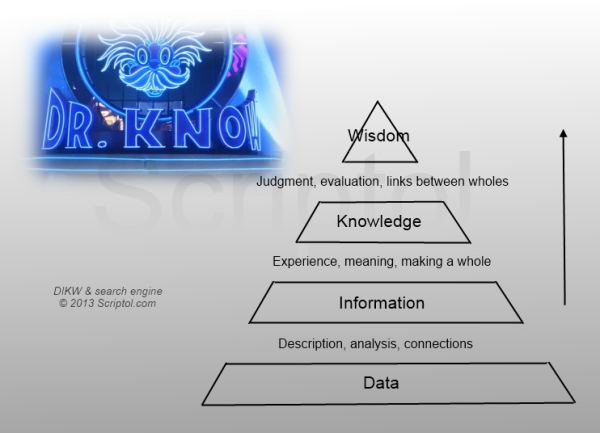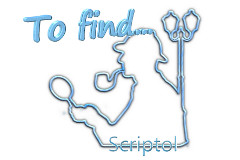DIKW, the pyramid that inspires the future of search engines
The secret of the pyramid, it's not a movie but the idea that directs online search technology.
This was revealed by the head of search at Google, in this video. At the base there is a DIKW pyramid, Data, Information, Knowledge and Wisdom.
It expresses a goal that will be accomplished by crossing a new step after the knowledge graph. It is displayed on the right side of results page, and it is to the link between a keyword and the object it represents.
The next step is that somehow the user also becomes an object for the engine, the engine knows him well enough to know exactly what answer to show. That requires that the engine has enough information about the context in which lives the user, so it is able to give relevant answers.
The purpose of the pyramid is to formalize how to structure thought to go from data to the ability to use them at best. Artificial intelligence uses this kind of formalism to represent and use knowledge, and search engines tend to do the same in order to make the site more intelligent. One step closer to a future where you will see a Dr. Know for the answer to any question, like in the A.I. movie from Spielberg.
The pyramid shows how to pass from collected data to wisdom which is the ability to use them perfectly.
- Everything starts with data collection.
- Data become information when you interact with them, they are processed. In online search, when the results are presented in response to queries.
- Information becomes knowledge when one puts them in touch and they form a whole. This is what the knowledge graph does.
- Knowledge becomes wisdom when you know how to use them to make good decisions.
Another interpretation seems much simpler, but it is also complementary:
- When you add a context to the data, it becomes information (this is where the knowledge of the user by the engine is relevant, the minimum useful being the request it does, but we want to know more).
- When you add meaning to information (so considering their effect and associating them with previous knowledge) it becomes knowledge.
- When you add insight to knowledge, it becomes wisdom.
Can also be described in five phases according to data processing operations made by who deals with them.
- Data. These are facts.
- Information. The description says what. This is a first interaction with the data.
- Knowledge. The conversion into process or instructions, tell us how to.
- Understanding. The explanation tells us why.
- Intelligence. Prospective assessment (impact study) tells us what is best to do.
So the processing goes in the past to retrieve the data and to the future to make decisions. And it is a cyclic process in perpetual renewal.
Yet another interpretation based on intellectual activities
- The data are the result of actions or records, textal or multimedia.
- The analysis makes the information.
- Confrontation with the experience increases knowledge.
- The judgment provides the wisdom.
How does this regard search engines? With the graph of knowledge, they are able to reach the level three, they have a knowledge that can be delivered to users. The next step is to provide intelligence, so they specify the right decisions. To become intelligent themselves.
One can understand the development followed by engines to achieve it, with a final more appropriate description:
- Data: collecting evidence to establish index of the engine.
- Establishing connections between the data: it becomes information suitable to users to display in SERPs.
- Making significant objects: it is the knowledge graph.
- Making the link between these objects, it is intelligence that we consider.
So you have an idea of the near future of search engines: they will be able to connect objects together to anticipate and respond to complex issues.




